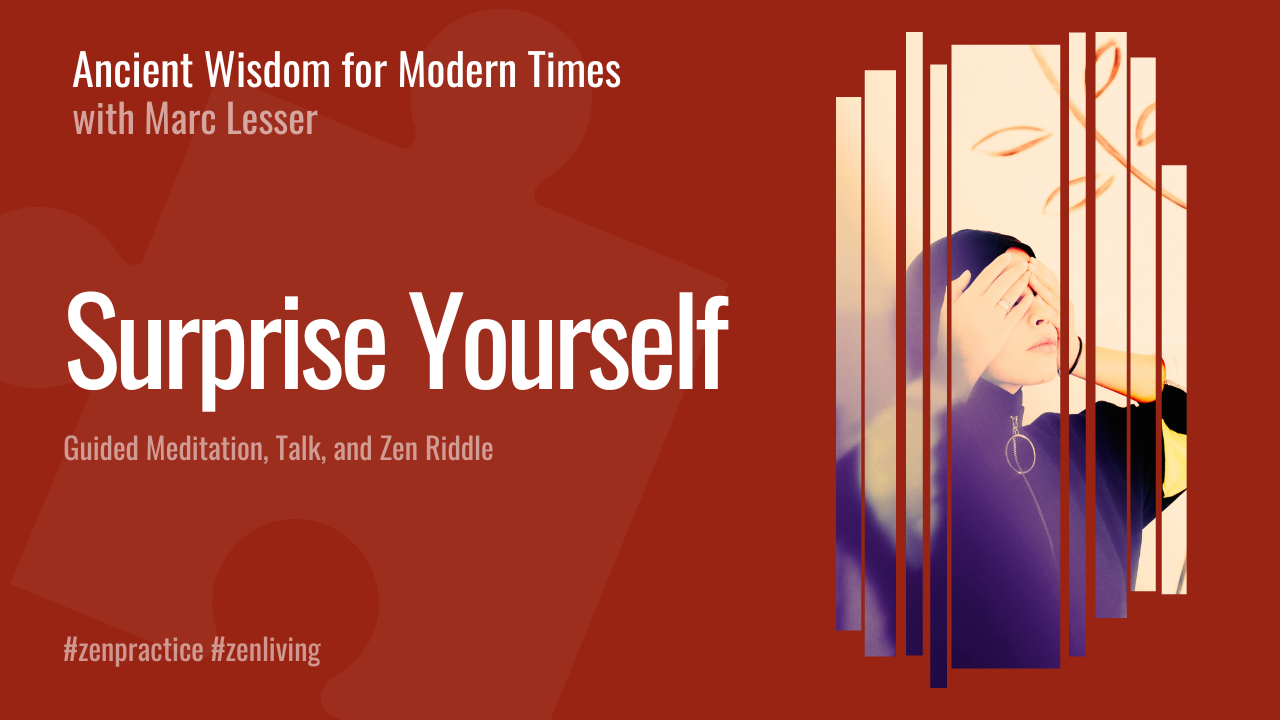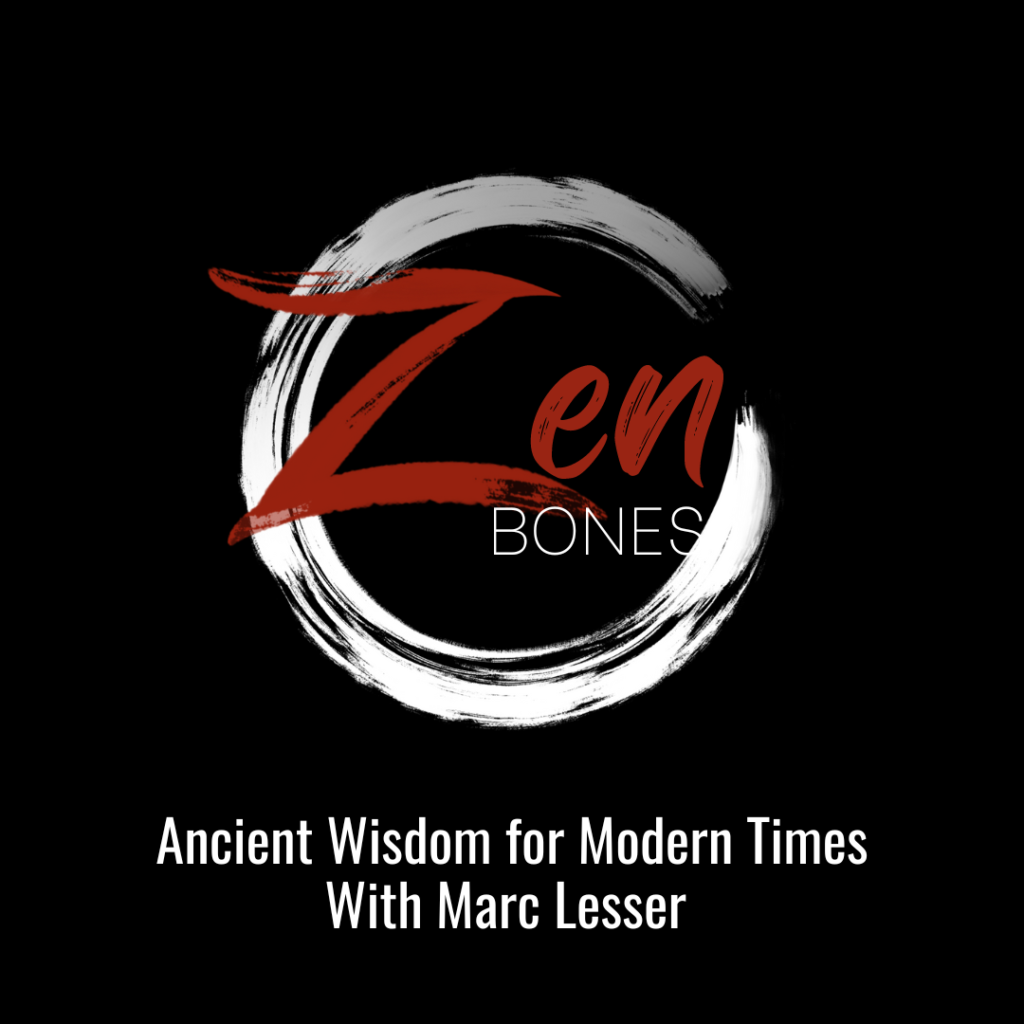What surprises you about your life right now? For me, the answer is “everything!” This episode of the Zen Bones Podcast features a short talk and meditation on the power of surprise, followed by a Zen puzzler or riddle featuring a quote from Zen teacher Dogen from the 13th century: “To study yourself is to go beyond yourself.” We’ll be exploring what that means and how it can support your wellbeing.
EPISODE TRANSCRIPT
[00:00:00] Marc Lesser: Welcome to ZenBones: Ancient Wisdom For Modern Times. This is Marc Lesser. Why ZenBones? Our world is in crisis and ever-shifting. Now more than ever, more wisdom, clarity, and courage are essential, especially in the world of work, business, and leadership.[00:00:00] Marc Lesser: In this practice episode, the topic is surprise yourself. The power of allowing yourself to see the world through the lens of the unexpected, what’s new and fresh, as a way of supporting yourself, changing yourself, opening. We start with a short-guided meditation, and then a talk featuring a variety of surprising poetry and the practice of surprise. And then a Zen puzzler where the quote comes from Zen teacher, Dogen about studying yourself and going beyond yourself. I hope you find this episode useful and surprising. Thank you.
Let’s do a short meditation together. I would invite you to stop and pause, and find a way to sit or stand wherever you happen to be just noticing. Noticing your body, noticing your breath, noticing your thinking, mind, your mood. I would suggest here an approach of being surprised by everything. Surprised to be wherever you might be and whoever you might be right now.
How did this happen? How did you get here? How did you become whoever you are? Amazing, surprising. Just opening, opening your mind and your heart. Letting it in, letting it in, this sense of curiosity, this childlike curiosity. What is it like to be here? What is it like to be alive right now? One of my favorite journaling prompts is what surprises me about my life right now is what surprises me. As a way of letting go, letting go of the past, letting go of our expectations about the future, and finding ourselves new, fresh, open, alert, surprised right now. What a relief. What a relief to be new.
It’s a bit like shedding. Shedding our old skins and emerging new. Shedding with each breath, letting go, and emerging here, refreshed, alive, and surprised. Of course, this breath and this body are actually new and fresh. We don’t have to make it up, we don’t have to pretend. It’s seeing with more clarity, the reality of the freshness, and newness of our lives. Keeping it simple. Keeping it simple. Noticing the breath, noticing the body. Breathing in, breathing out.
Sometimes focused on the breath and the body, and sometimes opening, opening to your full experience, experiencing your experience with an approach of curiosity, here, now, relaxed, and alert, and comfortable with not knowing what will happen next. Opening to being surprised. Now, using the breath in the body as allies, as anchors. Please feel free to continue sitting for as long as it feels right. If this is the right time, let’s go about the activity of our days, but with this attitude, imagine bringing this attitude of curiosity and surprise into everything that we do, into every conversation, into every activity. Thank you very much.
Why is it that we seem to remember events that surprise us more than others? I noticed that I’m surprised by nearly everything in my life right now. These surprises include that I’m a grandfather and that I have two grown children, that I’m a Zen teacher, as well as that I love teaching and speaking to large groups. Growing up in a somewhat sheltered and not very aware child in suburban New Jersey, I never would’ve predicted that my life would have unfolded this way. It really is the surprising things in our lives that prove to be the most memorable.
This, I’ve noticed, is true in prose and poetry, or humor, or language that involve some form of surprise. It’s the unexpected delights that make these things unforgettable. Like, the Groucho Marx joke. Outside of a dog, a book is man’s best friend. Inside of a dog, it’s too dark to read. Or these lines from a poem by Tony Hoagland, where he says:
“Do you remember?
that time and light are kinds
of love, and love
is no less practical
than a coffee grinder”
Or these haiku by Kobayashi Issa translated by Hass, where he says, “Don’t worry spiders, I keep house casually.” Or, “The snow is melting and the village is flooded with children,” and a third haiku, “Goes out, comes back, the love life of a cat.” The Zen tradition emphasizes learning, changing, and growing through surprise. This is true of many Zen stories, including the foundational story of Zen, that is based on a sixth-century event that features Bodhidharma, who was credited as being the first Zen ancestor to visit the emperor of China. In this story, the emperor asks Bodhidharma, “What is the highest meaning of the holy truths?” He’s asking like, “What really matters? What is Zen? What’s the secret?”
Bodhidharma responds surprisingly empty without holiness. This was not at all what the emperor was expecting to hear. The emperor then asks, “Who are you? Who is this person in front of me?” Bodhidharma responds, “I don’t know.” Again, a most unlikely response and one which has now been handed down generations for 1,500 years of storytelling. Unorthodox answers like these and going against the grain of convention are a way of setting the tone of Zen, a way to wake us up, to surprise us. Shunryu Suzuki knew the power of surprise when he said, “The secret of Zen is just two words.” He paused and then said, “Not always so.”
Apparently, in his native language, he was thinking of two words, but this was perfect because in English, the secret was actually three words long. In many ways, its meaning also was mirrored in these words. The takeaway from this is that whatever we think is so is not always so. The world is not what we think. When we let go of our usual expectations, everything in our lives can become fresh and surprising. Why not take a moment to think about what has surprised you, maybe even just so far today? Has anything unexpected happened? Have many things unexpected happened?
You might do a little journaling exercise writing down the prompt. What surprises me about my life right now is, then give yourself 7 minutes or 12 minutes to write down what comes up for you. See what happens. It’s a good use of just a short amount of time. It can give you a chance to see yourself in the world through the lens of surprise, something which can be uplifting, informative, and surprising. Here’s a poem by Robert Bly about seeing the world through the lens of surprise. The poem is called Things to Think.
Think in ways you’ve never thought before.
If the phone rings, think of it as carrying a message
Larger than anything you’ve ever heard,
Vaster than a hundred lines of Yeats.
Think that someone may bring a bear to your door,
Maybe wounded and deranged; or think that a moose
Has risen out of the lake, and he’s carrying on his antlers
A child of your own whom you’ve never seen.
When someone knocks on the door, think that he’s about
To give you something large: tell you you’re forgiven,
Or that it’s not necessary to work all the time, or that it’s
Been decided that if you lie down no one will die.
I hope you can find surprise, the power of surprise in everything in your life. Thank you.
[music]
Welcome to The ZenBones Puzzler, where I will regularly be presenting a story or a Zen Koan or a poem. Something to contemplate to think about. A story that has purpose. It’s about developing greater insight and reflection. Not so much for a solution, but as a way to support your practice, a meditation in daily life.
[music]
Today’s ZenBones Puzzler is a short quote from Dogen, who was the 13th-century founder of Zen in Japan, in which he says, “To study the way is to study the self. To study the self is to go beyond the self. To go beyond the self is to feel your oneness with everything and everyone. To study the way is to study the self. To study the self is to go beyond the self. To go beyond the self is to feel your oneness.” Again, this is meant not so much to be looking for answers, I suggest bringing this up in your daily meditation. Maybe write about this in your journal. At times throughout the day, especially any time you have a little bit of space or feeling a little bit of stress and tension, I hope you’ll bring up this ZenBones Puzzler, and I hope it is enjoyable and insightful.
[music]
Our ZenBones Puzzler: “To study the way is to study the self. To study the self is to go beyond the self. To go beyond the self is to feel your oneness with everything and everyone.” This is a line I’ve been studying and contemplating for many, many years. I think, first of all, the first line to study the way, I think of the way, with a capital W, as to study what it means to be a human being. This really is the way. The way of being fully human, the way of living more in reality, the way of finding your true agency and power.
The study the way starts with the study of the self, the study of our strengths and weaknesses, our tendencies, our intuitions. This is a radical, mindfulness self-awareness. To study the way is to study the self. Then, I love, and it’s wonderful the next line of this quote by Zen teacher Dogen, to study the self is to go beyond the self. To go beyond the self can sound rather mystical. Again, I think part of this is rather ordinary. You could say it’s to help others. Going beyond the self is to be less driven by ego and orienting around self and to widen our perspective.
At the same time, I think going beyond the self also is a radical integration and wholeheartedness. To really be ourselves, to be ourselves fully. Then, the next line, which again, is translated in many, many ways. I’m translating it loosely here, as to go beyond the self is to feel your oneness, lack of separation with yourself, with others, and with all of life, with all of life. This is, I think, a description of freedom to not be separated, a radical sense of belonging. I look forward to continuing to work with this ZenBones Puzzler, and I hope you do as well. Thank you.
[music]
Listen in each week for interviews, teachings, and guided meditations. You’ll receive supportive tools for creating more meaningful work and mindfulness practices to develop yourself, to influence your organization, and to help change the world. Thank you for listening.
[00:18:48] [END OF AUDIO]









